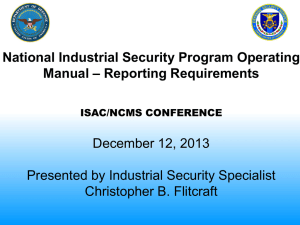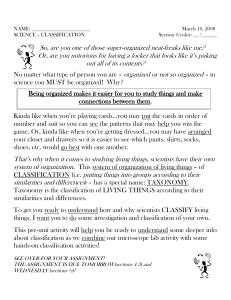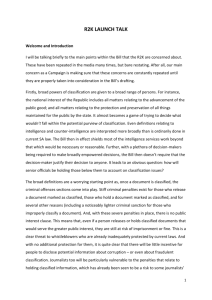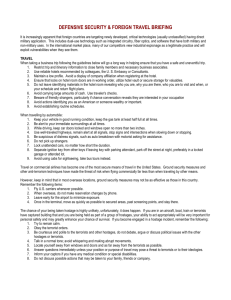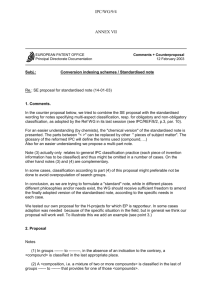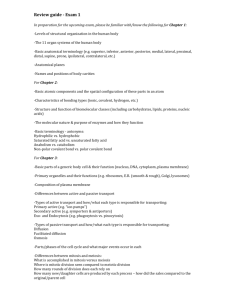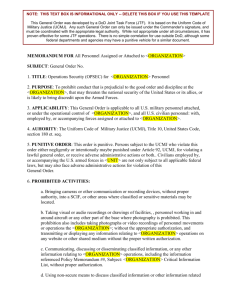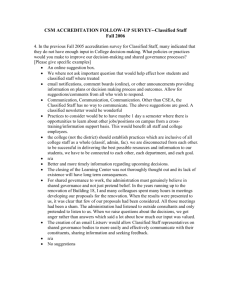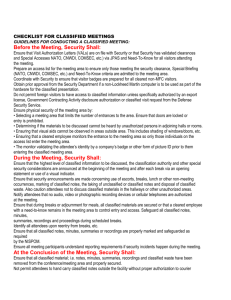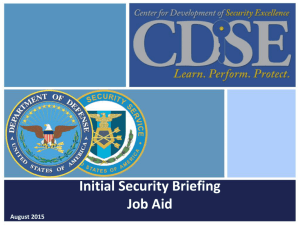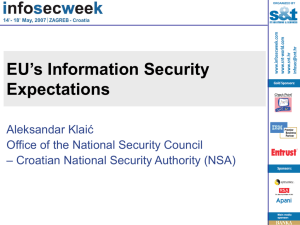Annual Security Refresher Briefing Note: All classified markings
advertisement
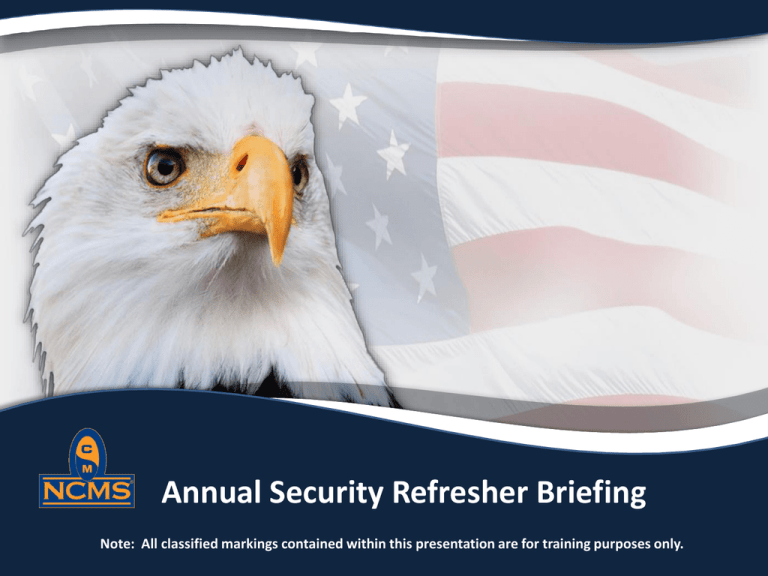
Annual Security Refresher Briefing
Note: All classified markings contained within this presentation are for training purposes only.
•
•
•
•
•
•
•
•
•
•
•
•
•
•
Overview
Classification System
Classified Safeguarding and Handling
Protection of Controlled Unclassified Information
Employee and Visitor Access Controls
Security Inspections and Reviews
Foreign Ownership, Control, or Influence (FOCI)
Requirements
Information Systems Security
Communication Security (COMSEC)
Reporting Requirements
Security Violations and Deviations
Threat Awareness and Defensive Measures
Quiz Questions
Summary
Overview
As a cleared Department of Defense (DoD) government
contractor, the protection of sensitive government
information (both classified and controlled unclassified),
is the responsibility of every employee of {Company},
regardless of how it was obtained or what form it takes.
Our vigilance is imperative in the protection and control
of this information. Under Executive Order (EO) 13526
and DoD Directives anyone with access to these
resources has an obligation to protect it. The very
nature of our work dictate that we lead the way in
sound security practices. Anything less is simply not
acceptable.
Overview
• As a cleared employee, you are required to receive
annual security refresher training and various
security awareness and training information on a
recurring basis to include but not limited to:
– Security newsletters
– Memorandums
– Pamphlets and guides
– Periodic bulletins
– Computer-based courses
Overview
• This briefing will:
– Meet the annual government security education
requirement
– Explain the importance of protecting government
assets and what is being protected
– Provide a basic understanding of DoD security policies
– Provide guidelines and tips to prevent future security
incidents
– Ensure all personnel have the same understanding of
their security responsibilities and reporting
requirements
Overview
Guiding Directive
• NISPOM: National Industrial Security Program
Operating Manual
– The NISPOM is the principle document governing U.S.
industry in carrying out contracts within the U.S.
Government Industrial Security Program
– {Company} is responsible for complying with the
requirements of the NISPOM in order to bid on or be
awarded a contract involving classified U.S. or foreign
government information
– All U.S. classified contracts must be accompanied by a
DD Form 254, Contract Security Classification
Specification
• This form becomes part of the contractual documents
and identifies what level of classified information is
required to accomplish the contract goals
Overview
Non-Disclosure Agreement (SF-312)
•
All personnel authorized to access Classified information
must sign a Non-Disclosure Agreement (NDA) with the U.S.
Government upon being granted access to classified
information with {Company}
–
•
The Security Department will inform you of your requirement
to review and sign the NDA
By signing this agreement you acknowledge that
–
A special trust has been placed in you
–
You are responsible to protect classified information from
unauthorized disclosure
–
You have received your security indoctrination for handling
classified information and notification of pre-publication review
–
This is a binding lifetime agreement, even when you no longer
require a security clearance
–
There are serious consequences for not complying with the
terms of this agreement which are punishable under Federal
criminal statutes, including imprisonment and fines
Overview
Why do we need Security?
• The protection of classified information is required in order
to protect national security
• DoD Security Regulations, Directives, and Programs are
established to counter threats to our national security
‒ Threats to classified and unclassified assets can include:
Insiders (government employees, contractor employees, and
authorized visitors)
Criminal and Terrorist Activities
Foreign Intelligence Services
Foreign Governments
• {Company} is assessed annually on its security compliance
and its ability to properly safeguard classified information
– A positive rating on this assessment is critical in maintaining our
facility clearance and continuing to do business with the U.S.
Government
